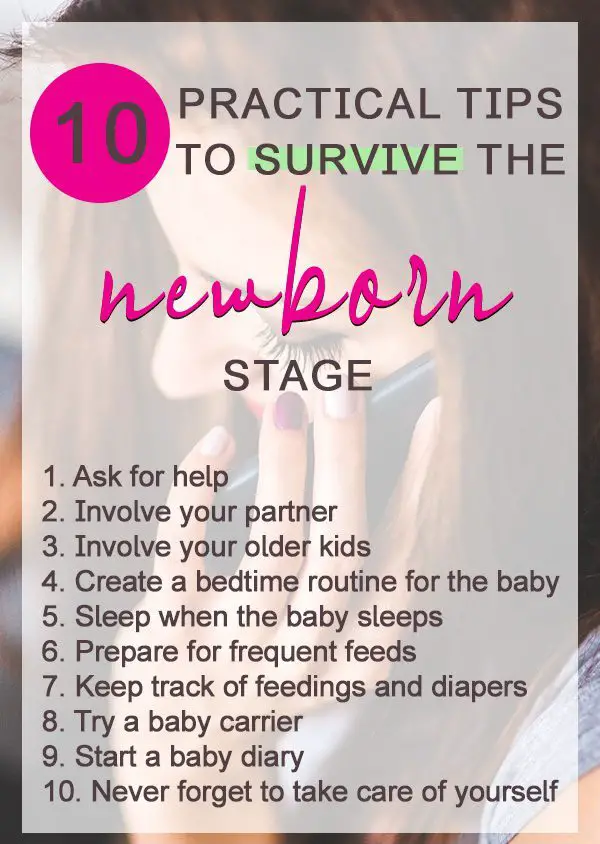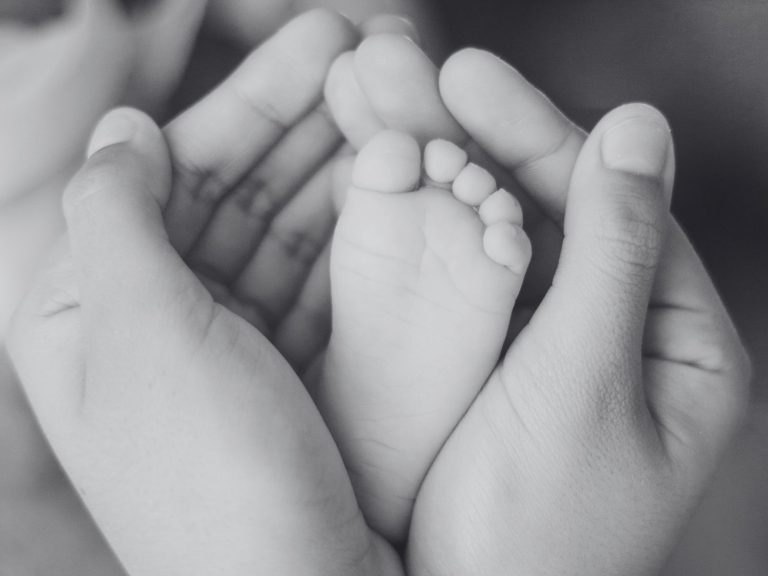A Practical Guide Through Your First Month With A Newborn
Being home with a baby can be both exciting and intimidating. Especially in the first month with a newborn. And especially if you’re a first-time mom.
When I was a first-time mom, I had no idea what to expect and what to do when I went back home with the baby. Now that my second child is nearly 2 months old I realize how much easier it is when you are properly prepared.
Note: This post may contain affiliate links, which means if you buy from my link I might make a small commission. This does not affect the price you pay. See the full affiliate disclosure here.
So, if you’re still expecting or just had your beautiful little one, this guide can help you transition better between expectations and reality.
Is the first month with a newborn the hardest?

You’ve probably heard the saying that you have to “survive” the first month with a baby? Is it really that hard? Well, yes and no.
Having a newborn at home can be challenging but it doesn’t have to be a painful experience. With the right organization and expectations, you can even enjoy the peace and quiet around a baby that sleeps through most of the day.
That is, if your baby is not colicky. If it is, forget what I just said about peace and quiet.
Speaking of personal experience, both my babies were/are colicky. And at times it really is difficult. But living with a kid doesn’t get easier after the first month.
You just learn to adapt!
This said, the first month with a baby is not the hardest. It is the one when you are most unprepared.
So what you need to do is set these realistic expectations, learn from the experience of others, and in no time you’ll be able to enjoy motherhood despite all the difficulties.
What can newborns do at one month?
When raising a baby you’ll most likely watch its development closely. There are multiple milestones that your baby will reach during its first year. During your first month with a newborn, however, you won’t have to worry about those.
That’s because there aren’t many things your baby can actually do at one month. Still, this is what you can expect.
Before we continue, however, I have a tip of advice: don’t compare your baby to others! Babies grow and develop at a different rate. With this said, the following should be looked at as a guide on what to expect rather than an exact pattern.
Sleep
Newborn babies sleep a lot! Like up to 18 hours a lot. And thank god, because during these first few weeks you’ll need every bit of rest to recover as fast as possible.
During their first 6 weeks when babies are still considered newborns, most would sleep between 14 and 17 hours a day. The rest of the time will be reserved for feeding, changing, playtime, and bathing.
Unfortunately, as much as they sound, these hours are not consecutive. In other words, your baby will most likely wake up every 2 to 4 hours in the first couple of weeks, and later every 1 to 3 hours because they are hungry, wet, or colicky. Or just doesn’t feel like sleeping right now.
The good news is that before you know it, your baby may be making a solid 6 hours during the night allowing you to get some proper night sleep.
We had our first 6 hours of night sleep when the baby was 8 days old, and the first 8 consecutive hours when she was 15 days old. Not that she slept for 8 hours every night since, but since then we’ve been able to get about 5 hours of uninterrupted sleep every night.
Feedings
In the best case scenario, you’ll be breastfeeding your baby for at least 6 months. However, breastfeeding could be quite intimidating, especially for first time moms.
It is important to know that breast milk may not run from the moment you gave birth. Especially if you had a c-section.
Just don’t give up!
In reality, newborn babies need very little milk in their first week.
Sight
Newborn’s sight is not quite developed. In the first couple of weeks, the baby will be able to see as far as 20-30 cm.
Or just far enough to maintain eye contact when breastfeeding.
At about 3 weeks their sight will improve enough to allow them to watch what you’re doing.
Also, don’t worry if your baby looks a bit cross-eyed sometimes. It takes a lot of effort on their side to focus on their surroundings. Help them by holding an object in front of them and move it slowly from side to side.
Head control
In your first month with a newborn, you’ll notice that their head is tilting from side to side. This is because their neck and shoulder muscles are not strong enough yet.
So at this age, you will need to support your baby’s head for them when your holding and feeding them.
Still, during tummy time, you may notice your baby trying to lift their head and turn it to the other side.
At the end of the first month, they may try to slightly lift their head from time to time.
Crying
Babies cry a lot! I’m sure there’s no need to tell you this.
In the first month, your baby could be crying anywhere from an hour to more than 6 hours a day.
I sincerely wish you a calm and sleeping baby, but if you’re not so fortunate, there are several tricks you could try.
- Hold them. Yes, as obvious as it sounds, the mother’s embrace and the sound of your beating heart does have a pretty good calming effect on newborns.
- Talk/sing to them. Aside from your heartbeat, the mother’s voice is another thing they still remember.
- White noise. White noises also remind the newborns of the time in the womb. Specifically, of the sound your bloodstream made. And while you could purchase an expensive white noise machine, or turn on the actual hair dryer, it may be better if you played a youtube recording instead.
- Hold their hands. Do you know why swaddled babies are so calm? First, because they’re tight and warm like in the womb. And second, because their hands are secured. Babies tend to wave their hands instinctively and wake up from the movement. By holding their hands they can feel the warmth of your hands and ease into sleep.
- Get a baby carrier. It will allow you to hold your baby while keeping your hands free. Be careful to choose a carrier that is suitable for newborns. A consultant at the local baby carrier shop should be able to help you choose the one to suit you best.
- Give them a pacifier. Babies have a sucking reflex that calms them down. If it’s not feeding time yet, offer them a pacifier or help them find their own finger. Many moms are afraid of thumb sucking or offering a pacifier due to the risk of teeth or jaw deformations. To avoid any negative consequences, you would need to keep the sucking under control and break the habit by the age of 2-3 years old. And that’s not as hard as it sounds.
How do you play with your newborn baby?
While “play” may not be the best word to use, there are still things you can do with your newborn baby.
Tummy time
This is pretty much as far as play time goes during the first month with a newborn.
Tummy time strengthens the baby’s bone structure and muscles. Start with about a minute and gradually increase the time they spent on their tummy.
Some babies don’t like this position at first. Thus, you may try to calm them down by lying next to them, talking, or caressing their back.
Important note: Don’t leave your baby sleeping on their tummy this early on. It could be very dangerous as there is a risk of suffocation.
Talk to them
As basic as this seems, the sound of your voice can be very calming to your baby. Anything is fine when you speak in a calm and soft tone. Ask the baby if they’re hungry. Tell them it’s time for their bath.
Engage in a “conversation”
When the baby starts making baby sounds respond by imitating the sound they make. This will set the ground for turn-taking conversations later on.
Sing and play music
In their first month, babies can recognize the sounds they’ve heard while in the womb. That’s why mom and dad’s voices usually have a calming effect on newborns.
Thus, by singing and playing familiar tunes your baby will feel more calm and secure.
Feel free to introduce new lullabies and nursery rhymes as well, sing-along when you can, and try to maintain eye contact for some quality bonding time with your little one.
First month milestones to look for
By the end of the first month your baby may meet the following milestones.
- Recognize familiar faces and voices (mom, dad, a grandma they see often)
- Smile at familiar faces
- Notices the sounds in their surroundings
- Tries to lift their head during tummy time
Keep in mind that all babies develop at a different rate. So, as you’re reading this post about the first month with a newborn and their development, think of it as a guide, rather than a rule.
And if you’re still expecting your baby, here are a couple other posts that you may find helpful.







